JASMINE REVOLUTION “PROTESTS” IN CHINA
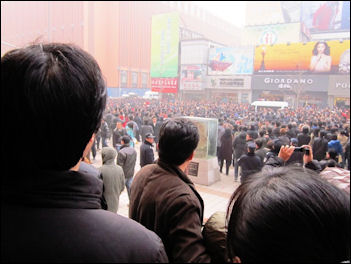
Wangfujing Street in Beijing The so-called Jasmine Revolution — plans for big protests in China similar to those in the Mideast and North Africa — didn’t amount to much but they scared Chinese authorities judging from their response, Jaime FlorCruz of CNN reported. In February 2011 microbloggers passed around tweets calling for protests at 2 p.m. on February 20, 2011 in a dozen major Chinese cities, including Beijing, Shanghai and Guangzhou. But no specific place was cited until several hours beforehand. [Source: Jaime FlorCruz, CNN, February 21, 2011]
Tunisian revolutionaries who successfully revolt against the country’s dictatorial president called their struggle the “Jasmine Revolution.” The flowering cousin of the olive tree, jasmine is widely grown in China and used in popular Chinese teas and is the subject of a celebrated folk songs and poems. A Qing dynasty paean to the flower, “Mo Li Hua,” was played each time medals were presented during the 2008 Olympics in Beijing. It goes: A beautiful jasmine flower, A beautiful jasmine flower, Perfumed blossoms fill the branch, Fragrant and white for everyone’s delight. Let me come and pick a blossom To give to someone, Jasmine flower, oh jasmine flower.
The online posts that started the whole process going were of unknown origin, but appear to have originated outside of China. They were first circulated on an overseas Chinese news website — Boxun.com, which frequently hosts dissident writings — and called for Chinese to gather peacefully at sites every Sunday in a show of people power meant to promote fairness and democracy. The Boxun posts were forwarded and reposted on microblogs in China but censors quickly deleted them and arrested people in China who were posting them. A renewed called a week or so later expanded the target cites from 13 to 27. On March 5, 55 locations in 41 cities were named, all popular gathering places, such as a Starbucks in Guangzhou and a spot in front of the statue of Mao Tse-tung in Chengdu.
Participants were urged to conduct a ‘strolling’ protest against government and shout: “We want food, we want work, we want housing, we want fairness.” Some posts urged participants to ‘stroll silently holding a jasmine flower. A post signed "The Initiators of Chinese Jasmine Revolution" read: "No shouting or slogans, just walking and smiling."
Barbara Demick and David Pierson wrote in the Los Angeles Times, “The technique of an innocuous stroll — san bu, or making steps — was used in 2008 by Shanghai homeowners who objected to the building of a high-speed railway line and has since caught on among middle-class protesters who wish to express their grievances without facing arrest. The first gathering Feb. 20 drew only a few obvious participants and a larger crowd of journalists, security and onlookers, among them U.S. Ambassador Jon Huntsman, who said later that he just happened to be passing by. But a few days later, Chinese authorities got serious about the threatened protests. They began calling news bureaus in Beijing, telling foreign journalists they would not be permitted to go to the demonstration sites. And publicists should note: If there is one thing guaranteed to get journalists to turn out on their day off, it's telling them that they can't go.” [Source: Barbara Demick and David Pierson, Los Angeles Times, March 5, 2011]
Although nothing about the protest appeared in the tightly controlled state press, information has spread via word of mouth in large part because managers of state companies have been warning their employees not to go out on Sunday afternoons, lest they stray into a protest location."The government is going crazy. It faces a high cost in trying to control this kind of demonstration because they don't know who their opponents are," said a Chinese blogger quoted by the Los Angeles Times. "And it's safe for participants; they can just pretend they're out shopping for the day."
Articles on PROTESTS AND CORRUPTION factsanddetails.com
”Jasmine Revolution” Protests in Beijing
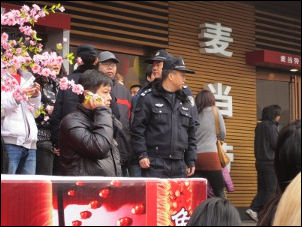
Wangfujing Street in Beijing In Beijing February 20, at the same time as the Shanghai and Hong Kong non-events, a strolling protest was scheduled to take place in Wangfujing, a typically busy shopping street less than a kilometer from Tiananmen Square. Wangfujing was the perfect place to call for an ambiguous mass action. The four-lane street is a designated pedestrian street, with thousands of people walking there at any given business hour; no cars and buses are allowed. For decades it has been a favorite shopping district. How could you arrest people for “strolling” or “walking” when that is what they are doing anyway” And how could authorities tell the difference between protestors, shoppers and curiosity seekers?
In any case a large number of police and journalists gathered near the McDonald’s at Wangfujing along with a few potential protesters and onlookers — it was hard to tell the difference. Police told people to move along and shoved a few people who got angry.
At around 2:15 p.m., according to CNN's Tomas Etzler, who saw the scene, a large presence of police “uniformed and in plain clothes — mingled with a gaggle of foreign journalists and scores of people carrying digital cameras. Soon they gathered a group of onlookers from the usual traffic of shoppers and tourists. Around this time, a young man started arguing with the police. It is not clear whether the event was related to the planned protest or "performance art." Most of the crowd dispersed after an hour. Security officials exercised restraint in handling the scene, Etzler said.
One man who stopped by police after he placed a jasmine flower in a planter in from of McDonald’s told AP, “I’m quite scared because they took away my phone. I just put down some white flowers, what’s wrong with that? I’m just a normal citizen and I just want peace.” security agents tried to haul him but a swarm of journalists seem to have prevented that from happening.” [Source: Anita Chang, AP, February 21, 2011]
Anita Chang of AP reported: “Two other people were taken away by police, including a shabbily dressed old man who was cursing and shouting, though it wasn't clear if he was there because of the online call to protest. Any potential protesters were far outnumbered by hundreds of rubberneckers at the busy Wangfujing pedestrian mall, who wondered if there was a celebrity in the area because of the heavy police presence and dozens of foreign journalists and news cameras.” [Ibid]
Sharon LaFraniere and Edward Wong wrote in the New York Times: ‘security officers and volunteers were present every few feet on both sides of Wangfujing and on side streets. There were police officers in black uniforms; civilian volunteers wearing red armbands; men dressed as street sweepers and officers disguised in plain jackets with telltale black wires running from inside their jackets to earpieces. Many of these men had crew cuts and carried videocameras or small shoulder bags; those with videocameras would occasionally take shots of the crowds.” [Source: Sharon LaFraniere and Edward Wong, New York Times, March 2011]
▪’security vehicles of every stripe — squad cars, vans, unmarked buses with few windows — were parked on all corners. Fake construction walls that had been erected last week outside the front entrance of McDonald’s blocked the plaza there. Customers had to enter through the side, where plainclothes security officers loitered on the steps. ..No one gathered outside.”[Ibid]
Around Tiananmen Square and Zhongnanhai, the seat of China's government, there was significantly more — but not massive — security presence. Tourist traffic on Tiananmen Square appeared normal, with a couple Chinese tourists seen taking pictures in front of the Zhongnanhai front gate, watched by half a dozen police officers. [CNN, Op. Cit]
“I don’t think this was ever a serious plan. It was more like a performance or a stunt,” Cui Weiping, a Beijing-based scholar told Reuters. She said who said she was not allowed outside by authorities, who she said ‘seem to have just confined anyone they could think of.”
“Jasmine Revolution” Protests in Shanghai and Hong Kong
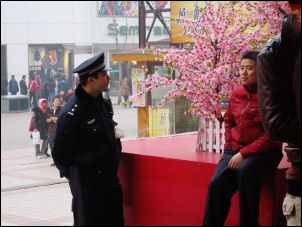
Wangfujing Street in Beijing On February 20, occurring the same time as the Beijing protest, Anita Chang of AP reported: “In Shanghai, three people were taken away by police after scuffling in front of a Starbucks coffee shop in what appeared to be an attempt to attract attention. They were not holding placards and their intentions were unclear.” People contacted in Tianjin, Guangzhou , Shenzhen, Wuhan, Shenyang, and Harbin and other cities where protests were supposed to be held said no demonstrations occurred. [Source: Anita Chang, AP, February 21, 2011]
“Ahead of the planned protests,” Chang wrote, “more than 100 activists in cities across China were taken away by police, confined to their homes or were missing, the Hong Kong-based group Information Center for Human Rights and Democracy said. Families and friends reported the detention or harassment of several dissidents, and some activists said they were warned not to participate...Searches for "jasmine" were blocked on China's largest Twitter-like microblog, and status updates with the word on popular Chinese social networking site Renren.com were met with an error message and a warning to refrain from postings with "political, sensitive ... or other inappropriate content." [Ibid]
In Hong Kong, at the same hour as the protests in Shanghai, CNN reported, “police outnumbered 30 demonstrators outside the gates of the Liaison Office of the Central People's Government. Leung Kwok Hung, a lawmaker nicknamed "Long Hair," told the tiny crowd that the demonstration was the first in Hong Kong in support of China's "Jasmine Revolution" and would not be the last. He led the group in chanting slogans against the Chinese Communist Party and the crackdown on activists, including lawyers and human rights advocates, in the mainland. Afterwards, some in the crowd made paper airplanes of their signs, which featured jasmine flowers, and threw them and paper funeral money over the fence onto the grounds of the liaison office. A security officer responded by loudspeaker, saying that if the protesters did not stop, he would file an official complaint. The protest ended after an hour, all in all a nonevent.” [FlorCruz, CNN Op. Cit]
Government Response to the Jasmine Revolution
Even though these attempts to initiate protests showed little traction and were described by many as non-events they apparently made Chinese authorities very nervous. A day before the planned protests, police reportedly detained scores of people, including lawyers and human rights advocates, in Beijing and other major cities. Among those detained during protest were European and Japanese reporters. In Shanghai, on the third Sunday after the first anonymous Internet posting, 17 foreign reporters were detained for showing up at the protest site because they did not have prior permission to be there.
After the protests China’s domestic security chief said the government must find new ways to defuse unrest. Zhou Yongkang, the ruling Communist Party’s top law-and-order official, told cadres they had to “adapt to new trends and imperatives in economic and social development,” official newspapers reported on Monday. ‘strive to defuse conflicts and disputes while they are still embryonic,” he told an official meeting on Sunday, the China Police Daily and other papers reported. [Source: Chris Buckley, Reuters, February 21 2011]
The Chinese state media was largely silent on the planned protests, although state news agency Xinhua published two short articles that described how police dispersed the crowds that had gathered in Beijing and Shanghai. “There is no collective will for revolution in China,” said an English-language opinion piece from The Global Times, a popular tabloid published by China’s Communist Party.
A report on the front page of the Beijing Youth Daily stated: “Firstly we must recognize that some people with ulterior motives at home and abroad are using various means to ince street politics. They are using the Internet to create and disseminate false information incite illegal gatherings in a bid to bring chaos tom the Middle East and North Africa to China, to mess up China.” A report in the Jiefang Daily, the Communist Party mouthpiece in Shanghai sated: “People must....highly cherish and consciously maintain hard-w-n stability like they take care of their own eyes.”
Beijing also stepped up the filtering and control of the internet since the outbreak of protests in the Arab world. Search functions for words like "jasmine" and "Egypt" are blocked on certain sites like Sina Weibo and Facebook-like Renren, The popular Sina Weibo microblogging service was erratic, with retweeting and the posting of photos blocked. China filed subversion charged against Internet users who proposed calls for protests. In March , the government told the public heeding the calls to protest could bring “disaster.” Along with all this the Chinese government also promised it would do more to address grievances by ordinary Chinese over things like corruption, income disparity, inflation and rising home prices.
In Beijing, on following Sundays when protests were also called for, water trucks of the kind used to settle dust on the street moved up and down the area of the scheduled protests, apparently ready to douse anyone who participated in a protest, keeping crowds huddled by the sides. Police with German shepherds patrolled Tiananmen Square. At one gathering near Shanghai’s People Square during the second weekend of protests, uniformed police blew shrill whistles nonstop and shouted at people through megaphones to keep moving. About 200 people — a combination of onlookers and quiet protestors — were there.
Crackdown After the “Jasmine Revolution” Protests
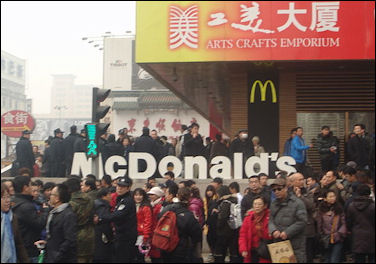
Andrew Jacobs and Jonathan Ansfield wrote in the New York Times, “Even if Chinese cities have been free from any whiff of revolutionary turmoil, the war on jasmine has not been without casualties, most notably the ever-expanding list of democracy advocates, bloggers and other would-be troublemakers who have been pre-emptively detained by public security agents. They include the artist provocateur Ai Weiwei. [Source: Andrew Jacobs and Jonathan Ansfield, New York Times, May 10 2011]
The New York Times reported that travel restrictions on Chinese critics of the regime were imposed and dozens of cultural forums and other events involving Western embassies were cancelled “as the Chinese government has shown a growing suspicion of foreign influence and Western ideas. These moves came even though a “jasmine revolution” failed to draw much attention except from Chinese security forces and foreign media. [Source: Keith Bradsher, New York Times, May 9, 2011]
In what turned out to be the most expansive assault on dissent in China in years hundreds of Chinese have been detained, imprisoned, beaten, interrogated or put under house arrest. Unregistered Christian were arrested and house churches were shut down. In addition to High-profile critics like Ai Weiwei legions of little-known bloggers, rights lawyers and democracy advocates disappeared. On the crackdown China Geeks reported: “While the central government is busy rounding up everyone who might have once glanced at Ai Weiwei, and simultaneously instituting what appears to be some kind of “no lawyer left behind” detention policy, the rest of China is mostly ignoring it. That’s not a surprise, of course; it isn’t being reported in the media aside from the occasional screeching prose of the state-media’s shrillest news organs, which no one reads anyway. Whether Ai is guilty or not; whether these other lawyers and writers and “dissidents” are guilty or not, they aren’t an actual threat to China or to CCP rule. Neither was the Jasmine Revolution, which shock! wasn’t orchestrated [Source: C. Custer, ChinaGeeks, April 16, 2011]
“Ai Weiwei may prove to foreigners that there’s no rule of law in China, but most Chinese don’t know or care,” China Geeks said. “What they care about are cases like this, and little by little, the police and the businessmen and the chengguan and the officials — all agents of the government and the Party — seem to be doing their best to drill home the message: we do not care about you. There is, at present, no push for revolution, no great Westernized uprising. There’s nothing to make a sexy headline out of on CNN. What there is, though, is bubbling dissatisfaction just below the surface of everyday life that bursts out in spurts when the inequities of society make themselves unavoidably obvious.” [Ibid]
The Economist reported: ‘since the late 1970s, when China began to turn its back on Maoist totalitarianism, the country has gone through several cycles of relative tolerance of dissent, followed by periods of repression. But the latest backlash, which was first felt late last year and intensified in late February, has raised eyebrows. It has involved more systematic police harassment of foreign journalists than at any time since the early 1990s. More ominously, activists such as Mr Ai have often simply disappeared rather than being formally arrested.” [Source: The Economist, April 14, 2011]
In April 2011, two activists involved with the Jasmine protests — Hua Chunhui and Wei Qiang — were sentenced with trials “reeducation through labor” at a labor camp. By that time Secretary of State Hillary Clinton said the United States was “deeply concerned” about China's crackdown, saying “dozens” of rights lawyers, writers, intellectuals and activists had been “arbitrarily detained and arrested.”
Willy Lam wrote in China Brief: “That the Hu Jintao leadership regards fighting the so-called Jasmine Revolution and allied attempts at undermining the CCP’s authority as a long-term struggle, however, is evidenced by a series of commentaries published by the conservative Beijing Daily and the Liberation Daily” after the protests. “In a signed commentary, the Beijing Daily warned against “people with ulterior motives in and out of China who want to bring chaos [associated with color revolutions] into China” through acts such as “holding illegal gatherings and attempting to fabricate incidents.” Similarly, the Shanghai-based Liberation Daily fingered anti-Chinese elements who were allegedly “confusing and poisoning people’s minds in an effort to stir up “street politics” and plunging China into chaos.”“ [Source: Willy Lam, China Brief, March 10, 2011]
"The Chinese government is its own worst enemy," Minxin Pei, a Chinese-born political scientist at Claremont McKenna College, told the Los Angeles Times. "You can see that the level of paranoia and insecurity at the top levels of the Chinese government is truly beyond what you would imagine."
Reasons for Crackdowns on Culture After the Jasmine Revolution
The Economist observed: “Western observers tend to describe the crackdown as a massive overreaction to perceived threats, but it may well be that China’s rulers know better. True, no seething mass stands ready to overthrow the regime. But in a vast country, many aggrieved people, from dispossessed villagers through unemployed graduates to angry bloggers, resent the state. The government is quite capable of handling each of these groups separately. But were those with grievances ever to coalesce, especially if the growth slows — as it will sooner rather than later — they would represent a potent force. The view from Beijing, thus, is different to the view from abroad. Whereas the outside world regards China’s rulers as all-powerful, the rulers themselves detect threats at every turn. The roots of this repression lie not in the leaders’ overweening confidence but in their nervousness. Their response to threats is to threaten others.” [Source: The Economist, April 14, 2011]
The Economist speculated: This “abnormally heavy-handed approach suggests that shifting forces within the Chinese leadership could well be playing a part. China is entering a period of heightened political uncertainty as it prepares for changes in many top positions in the Communist Party, government and army, beginning late next year. This is the first transfer of power after a decade of rapid social change. Within the state, new interest groups have emerged. These are now struggling to set the agenda for China’s new rulers. [Ibid]
“The manner of the recent crackdown could be a sign heavy-handed crackdowns on perceived troublemakers — combined with token amounts of spending on housing for the poor — is gaining favor in Beijing. It is also a sign of the increased influence of the domestic security apparatus since 2008, when China pulled out all the stops to stop unrest marring the Olympic games in Beijing. The power of Zhou Yongkang, the member of the Politburo’s standing committee in charge of security, is widely thought to have grown along with a rapid increase in government spending on his portfolio.” [Ibid]
Provincial and ministerial level officials met in Beijing to discuss how to cope with these worries through stronger ‘social management,” and President Hu Jintao himself told them that they should be worried. “The problems remain of development that is unbalanced, ill-coordinated and unsustainable,” Hu said in a speech on Saturday. He urged the officials to ‘strengthen governance to nip social conflicts in the bud.”
One of the most powerful criticisms of the clampdown came on April 8th from Mao Yushi, a notable economist. In a blog posting at Caixin Media, an outspoken publishing group, Mr Mao accused leaders of making a mistake by neglecting political reform in their plans for China’s development in the next five years. Spending ever greater sums on maintaining stability, he said, just made citizens more hostile. Determined not to allow any disruption to next year’s high politics, Chinese leaders are willing to take that risk.
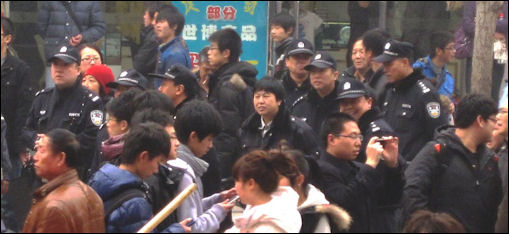
Wangfujing Street in Beijing
Jasmine Becomes Contraband
Andrew Jacobs and Jonathan Ansfield wrote in the New York Times, “Beginning in February, when anonymous calls for a Chinese “Jasmine Revolution” began circulating on the Internet, the Chinese characters for jasmine have been intermittently blocked in text messages while videos of President Hu Jintao singing “Mo Li Hua” [the jasmine song] have been plucked from the Web. Local officials, fearful of the flower’s destabilizing potency, canceled this summer’s China International Jasmine Cultural Festival.”[Source: Andrew Jacobs and Jonathan Ansfield, New York Times, May 10 2011]
“In March police issued an open-ended jasmine ban at a number of retail and wholesale flower markets around Beijing. The origin of the ban was a mystery. The Beijing Public Security Bureau declined to answer questions about jasmine. But a number of cut flower and live-plant business owners said they had been either visited by the police in early March or given directives indicating that it had become contraband.” [Ibid]
“Although some vendors were given vague explanations for the jasmine freeze — that the plant was ‘symbolic’ of those people who wanted to sow rebellion — most people involved in the flower trade have been largely left in the dark about why they should behave with such vigilance, and some professed ignorance of the ban altogether. Thanks to a censored Internet, most Chinese have never heard of the protest calls in China , nor are they aware of the ensuing crackdown.” [Ibid]
“In the absence of concrete information, fantastic rumors have taken root. One wholesale flower vendor at the Jiuzhou Flower and Plant Trading Center in southern Beijing said he heard the ban had something to do with radiation contamination from Japan. A young woman hawking floral bouquets at Laitai, a large flower market near the United States Embassy, said she was told jasmine blossoms contained some unspecified poison that was killing people.” “Perhaps you’d like some white roses instead?” she asked hopefully. [Ibid]
Wu Chuanzhen, 53, a farmer who tends eight greenhouses of jasmine on the outskirts of the city, said other growers had insisted that adherents of Falun Gong, the banned spiritual movement deemed an “evil cult” by the authorities, might use the flowers in their bid to overthrow the governing Communist Party. “I heard jasmine is the code word for the revolution,” she said. Her laughter suggested she thought such concerns were absurd. [Ibid]
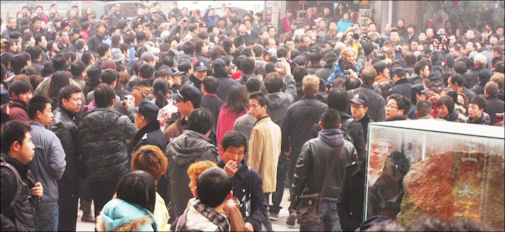
Wangfujing Street in Beijing
Beijing Blames Foreigners for its Fears of Unrest
Edward Wong and Jonathan Ansfield wrote in the New York Times, “At least 60 activities organized by the United States Embassy in Beijing — including cultural forums, school programs, ambassadorial visits — were canceled between February and April because of interference by the Chinese authorities, and some European missions have been similarly pressured. Several university conferences involving foreigners have been canceled, and the Ministry of Education is stepping up warnings to Chinese scholars heading abroad that they not take part in “anti-China” activities or engage with groups that promote democracy. The scrutiny has applied to some nonprofit groups, too, with several — particularly those that receive financing from the United States government or the European Union — being visited more frequently by tax officials.” [Source: Edward Wong and Jonathan Ansfield, May 5 2011]
“The government had for years guarded against Western influences, including blocking sites like Twitter and Facebook, but those restrictions have intensified since revolts began sweeping the Middle East and North Africa. The clampdown is concentrated on foreign groups or activities that have significant ties to foreign governments, run prominent outreach programs, encourage free speech or promote Internet freedom.” [Ibid]
‘senior Chinese officials appear to believe that the United States in particular helped set off and sustain the uprisings that toppled dictators in the Arab world. In mid-February, messages appeared on the Chinese Internet calling for people to hold similar protests across the nation. Some of the people spreading word of the so-called Jasmine Revolution are Chinese who live overseas.” [Ibid]
“One message called for Chinese to protest on Feb. 20 at a McDonald’s outlet on Wangfujing, a popular shopping street in Beijing, and the government became concerned when Jon M. Huntsman Jr., who was then the American ambassador to China, appeared that afternoon outside the restaurant. Embassy officials said Mr. Huntsman, who left his job at the end of April, was not aware of the calls for a protest, but the Chinese government quickly began canceling outreach activities sponsored by the American Embassy. That included one-time appearances by Mr. Huntsman in Chinese cities and regularly scheduled education programs in which American officials meet with Chinese students, according to interviews with foreigners and Chinese.” [Ibid]
“The cynic in me believes that, given the likely timing of this decision and of the onset of the Egyptian protests, this is not really about money or the value of international conferences, but about minimizing extended face-to-face dialogues with foreigners who might share ideas that were “bu shufu,” — said one American involved in cultural events, using the Chinese phrase for “discomforting.”

China Censors 'Egypt'
Even before the planned jasmine revolution protests the word “Egypt” was blocked on the Internet in China . Edward Wong and David Barboza wrote in the New York Times, “In late January 31, 2011, as protests in Egypt that ousted President Hosni Mubarak were gaining momentum, Sina.com and Netease.com — two of the nation’s biggest online portals’ blocked keyword searches of the word “Egypt,” though the mass protests were being discussed on some Internet chat rooms on Monday. Searching for “Egypt” has also been blocked on Weibo, the Chinese equivalent of Twitter.” [Source: Edward Wong and David Barboza, New York Times, January 31, 2011]
“The Chinese government has also tried to get out ahead of the discussion, framing the Egyptian protests in a few editorials and articles in state-controlled news publications as a chaotic affair that embodies the pitfalls of trying to plant democracy in countries that are not quite ready for it — a line China’s leaders have long held.
The English-language edition of Global Times, a populist newspaper, ran an editorial on Sunday about the Tunisian and Egyptian protests with the headline “Color revolutions will not bring about real democracy.”... Some Chinese news organizations have also seized on the ambivalent American reaction to the Egyptian unrest to underscore the hypocrisy of the United States in sometimes backing dictators over democracy.
Some of the news coverage of Egypt that has appeared in People’s Daily, the Communist Party’s main newspaper, and Xinhua, the official news agency, has focused on attempts by China to evacuate its citizens, simply leaving out the political discontent at the root of the unrest. Xiao Qiang, an adjunct professor at the University of California, Berkeley, and an expert on Internet censorship in China, said propaganda officials had recently ordered Chinese news organizations and Web sites to strictly follow Xinhua reports on Egypt.
But Mr. Xiao said some Internet forums were closely tracking the events in Egypt. “I can see the Egypt story being followed and discussed by active netizens everywhere — blogs, forums, social networking services like Kaixin and Renren,” he said. “It’s just not on the front page of major Web sites.”
The fact that social networking sites fueled the protests in Egypt spur Chinese officials to further scrutinize such sites in China. And they may be right to pay attention: Zhao Jing, a liberal Chinese blogger who goes by the name of Michael Anti, said that “it was amazing netizens on Twitter cared about Egypt so much? that they had begun drawing parallels between China and Egypt. President Hosni Mubarak of Egypt was being called Mu Xiaoping, a reference to Deng Xiaoping, who quashed the 1989 popular protests in Beijing, while Tahrir Square in Cairo was being compared to Tiananmen Square.
"Older Chinese are usually quick to point out that the relative calm of present-day China is far preferable to the tumultuous violence of past eras. Nor do younger strivers necessarily want to rock the boat. "Most Chinese, as we’ve said here many times, have little to no interest in democratic reforms Today’s Chinese have little appetite for chaos."
Image Sources: Human Rights in China, Wikicommons, YouTube
Text Sources: New York Times, Washington Post, Los Angeles Times, Times of London, The Guardian, National Geographic, The New Yorker, Time, Newsweek, Reuters, AP, Lonely Planet Guides, Compton’s Encyclopedia and various books and other publications.
Last updated July 2011
